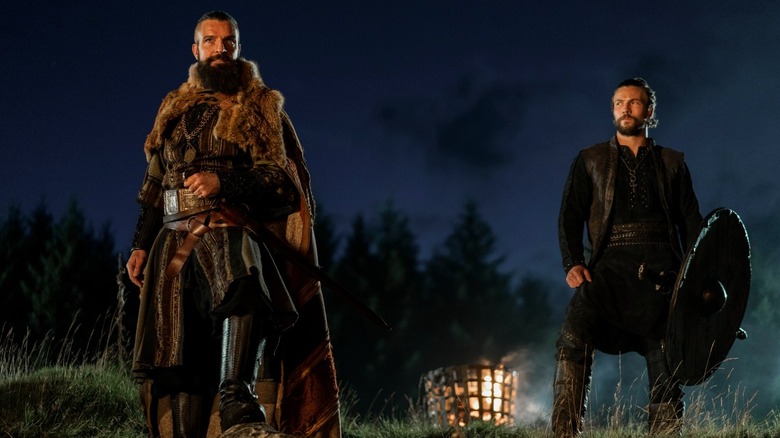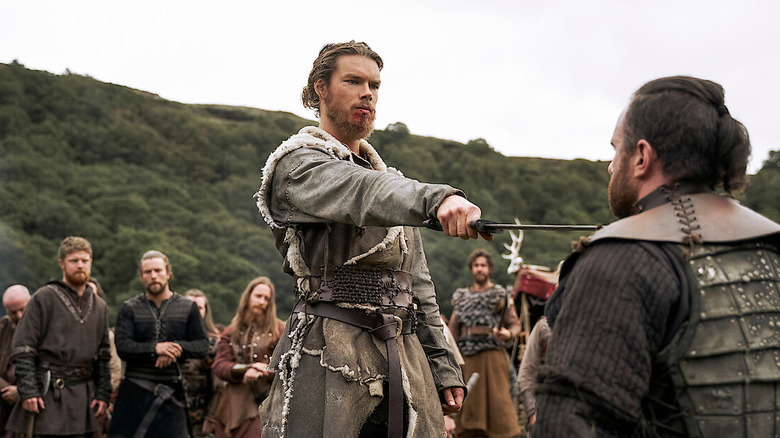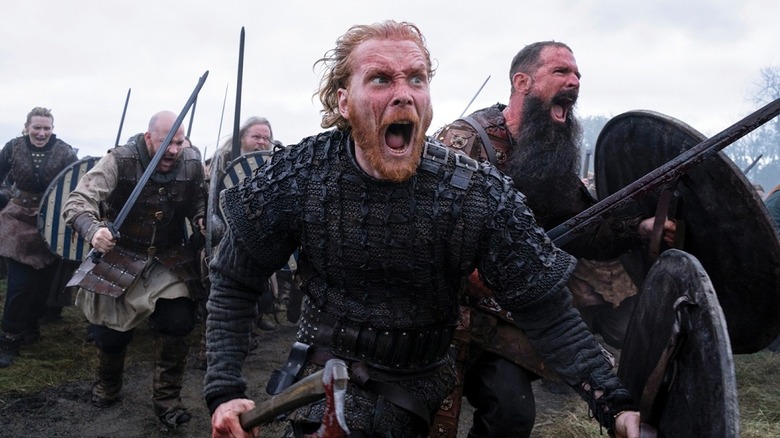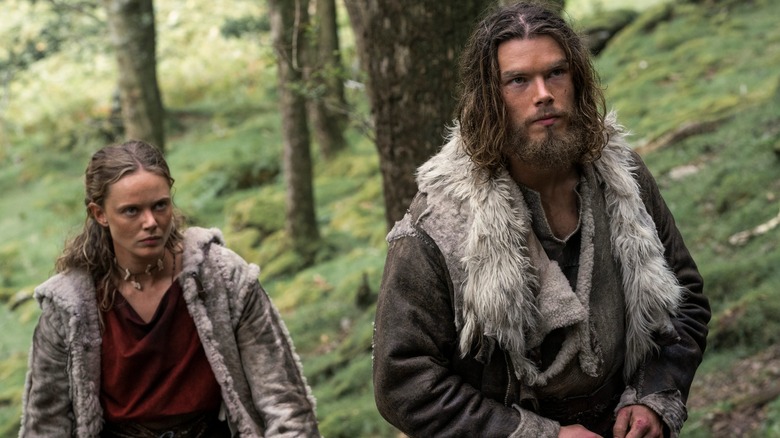Vikings: Valhalla Creator Jeb Stuart Wants To Raise The Bar For Action Shows [Interview]
"Vikings: Valhalla" is a large-scale, full-throttle action series. Series creator Jeb Stuart and his long list of collaborators waste no time getting to the action — the meat and potatoes of an epic story. It's a complex world packed with characters and history, but "Vikings: Valhalla" tells its array of stories with a ferocious pace without sacrificing substance. For Stuart, that sense of urgency comes from his history writing films.
Not just any old films, either. Stuart is the screenwriter behind "Die Hard" and "The Fugitive." He doesn't balance action and character; he makes them one whole, satisfying piece. Now, Stuart is again making character the spectacle in "Vikings: Valhalla," with a lavish scale that reminds Stuart of earlier times. "When I got into the business, I went down to Disney and they still had the Zorro backlot at the old Disney Studios now," he told us. "Here, it was cool to walk around and think, 'They don't make them like this anymore.' It's fun."
Based on our conversation with Stuart, who's already working on season two of the acclaimed series, he had his fair share of fun making "Vikings: Valhalla."
'I expect the camera to tell me a lot'
The scale of this show is something else, especially given how tangible it is.
The scale was what we're going for. That's been the hardest transition into television. I have real big taste and you're trying to get it into something that you can do in a two-week format. It takes a lot of planning. It takes a lot of talking, communication, as well as money, which we don't have. I'm glad that you feel like you saw the scope, because that was the goal.
What qualities or skills did you find translated naturally from film to television?
Well, it's interesting that over the course of my career I started in an academic approach. I did a master's in Chapel Hill, then I did a master's in Stanford, and then I did a year after at Stanford on the Nicholl Fellowship, because in those days, the Nicholl was at Stanford. I learned from a producer, Julian Blaustein, who was my professor at Stanford. It was nice to have a producer be your dominant force because everything had to do with [not getting] too hung up, let's say, in the "artiste."
I've taught at Northwestern in the last few years. Occasionally I get writers who come in and it's all about the art. And look, I'm all about that, but at the same time, we're all aware that it's a business. I'm eternally grateful to have somebody like that because Julian was a writer-producer and he had worked with this fabulous group of writers in the '50s and '60s and early '70s. When you know people like Ernie Lehman or Julie Epstein and all these great writers of that period, they informed me about the different variations of writing.
There's that spec script, there's the third rewrite, there's the polish, there's coming in to do production rewrites. There's writing ADR. I've had to do a 40-page ADR script for a movie. By the time I got to TV, Jack, I touched down in many areas, including directing and producing and developing. It just seemed natural that all these elements of the writing world, of the creative world came together. Look, nobody's going to mistake me for a great director, but I learned so much from doing that, both in a big show and in an independent piece.
From production rewrite, you walk in and a studio's expecting you to save the day and all the money's been spent. You can't build anything new. You got to redo it all within the format. All those things are really, really good training grounds for running a show like "Vikings: Valhalla," because it's big and it moves fast, which is very different from the old "Vikings." I think the Michael Hurst scripts, I don't think anybody would characterize my scripts and Michael's scripts in the same breath. In fact, when I came over to Ireland, the first thing my crew would say is, "Oh my God, these scripts are totally different." I said, "Well, how are they different?" They would say, "They just go. They just take off."
I think part of that may be my feature background because I expect the camera to tell me a lot, which means you got to have the crew set up to tell the story, not, "Okay, we're going to have a day where Jeff and Jack are going to talk and we set up." I'm not talking about just moving the camera with a Steadicam. I'm talking about telling the story much more visually so that we can get in and out. Anyway, that was very different.
Also, the size of the set pieces were very different. The character-based action, I think, was a lot different. I mean, nobody balked, Jack, I'm very fortunate. I have a fabulous crew. They jumped in. They bought into what this new idea or concept was going to be. I'm eternally grateful to all their efforts, because they're the ones who make those big pieces like London Bridge work.
You can see that approaching to the pacing right from the start. Usually, you get a lot of world-building with these shows and the pace gets turned up late. Here, right from the start, the world is built as the characters are literally running.
That, again, comes from my feature background. I mean, "Die Hard" is really a character-based action show. It comes from John McClane's situation. He's not a Marvel comic guy. It's not — as you described, it's not the world and then we build that up. It's this guy and he comes into a world that then becomes tough. I mean, same thing for "The Fugitive." Harrison Ford's just a doctor, and Dr. Richard Kimble has to prove that he loved his wife and he wouldn't have killed her. I think that's the way I approached "Valhalla."
We have this huge idea of revenge that's going to happen in England and a small group of Greenlanders who look like Vikings are in a Viking boat — that's something, but they don't have any of the DNA of this Norse culture. They haven't been brought up in that same group that Vikings 200 years earlier would've been. They're hunters and they're scratching out a living on Greenland, but when they arrive, they hold the power to transform this whole event that's about to happen, which is a cool place to start with.
'The vikings are underdogs'
Through all your research, what was it about this period in Viking history that was the right story to tell? Because you could've told a lot of different stories.
Yeah, yeah. I've said this before, but I did not have any desire to make season 7 of the original. If there's still life in the "Viking" world, it should have its own identity. It's like "Star Trek." I grew up with Leonard Nimoy and William Shatner, but I love Patrick Stewart and it's a totally different thing. I know you piss off the old guard, but you've got a whole other generation that never really thought that those ears looked that great on him anyway. You have to take certain jumps and risks when you do that.
In my research, I needed a jumping off point. I'm a big researcher, and I happened to come across a piece that I thought was pretty fascinating. I think it had come out in 2009 that they had discovered this grave under a church in Oxford they were remodeling and it had these very large male skeletons and their heads were on a pile over here, and the bodies were over here. It was clear from the hacks on the bones that they had been violently ambushed. Further research found out that this was probably the first domino in the St. Brice's Day massacre. I had never heard of the St. Brice's Day massacre.
By the way, St. Brice's Day massacre is not a bank holiday in England, it's genocide. So I thought, "Oh, I love the way this is feeling." The Vikings as underdogs, the Vikings as immigrants, and this feeling like there was a lot of stuff that resonated with me that was going on in the world at that time, all across the world. The cool thing about the Vikings is when they came in, they typically did not say, "We're the Vikings. We're going to take over and you're going to do it our way." They came in and they assimilated. They left behind these incredible gifts. But at the same time, they became part of the fabric of wherever they were. In the Rus, in England, in Constantinople.
Then to have somebody feel so threatened by them that they would exterminate them, that sounded like a really good story. The idea that I always was playing off of is at that exact moment back in Norway, in Sweden, the Christian Vikings were at the throat of the pagan Vikings. They were fighting and they hated each other. Some of the tales of the slaughters that were going on up there were just incredible. Yet they came together as Vikings one last time to come to England and set the situation straight.
I think we find that in our culture a lot. You get Republicans, Democrats, and they fight each other, and then suddenly you're attacked from the outside. They come together like in World War II or World War I, and you forget all your differences and you're American. That's exactly what happened with the Vikings. So I thought it was a wonderful tale to start this story off.
What else did you find relevant?
Again, these are pieces that come out of the characters. The Vikings had a couple of things that are really great qualities that we assigned to the Viking culture. For example, it was a time when women could divorce their husbands, they could own property, and they could rule kingdoms, because it was an egalitarian society. If you had the chops to do that, people would follow you. There were no rules set over the top of, say, of gender to clamp down on that. In fact, if you look at the gods in the Viking world, there were many gender-fluid gods. A homosexual society was accepted.
There are a lot of armchair researchers who will say, "Well, no, no, no. It was well known in the Viking world that gays were not accepted." Well, that came after the Christian part, after Scandinavia came along. And by the way, all those incredible wonderful sagas were written by Christian Vikings. They were written in the 12th century.
The "Vikings" Michael Hurst created, and that I'm picking up the storyline on, this was a great period in terms of being more progressive in certain aspects, in the way that they deal with people. They didn't have a word for racism. People of color — they were used to seeing people of color in their travels, they called them blue men. As long as blue men pulled their weight and acted like a man or a woman, then they were accepted.
So yeah, I think those were really cool things to write into. To circle back on your question, I just feel like for my cast, who was a younger cast in the original show, there are some things that are still very relevant, making a name for yourself, going to the bounds for glory or for achieving something with your life. There's a whole lot of ideas about your destiny. "What's my destiny?" You hear that a lot in the Viking world. Well, the Vikings pretty much came around to the idea that we can't control our destiny, but what we can control is how we face our destiny. The cool thing about "Valhalla" is, "Look, I may die in this battle, but if I die giving everything to it, then I'll be welcomed at Odin's table and be brought in with the rest of the great warriors of history." That's a pretty cool way to approach life. I think that's something that does resonate with an audience.
You show those great qualities, but the horrific qualities, as well. You didn't want to shy away from that, right?
Yeah. It's the Middle Ages. By the way, let's get over ourselves. I can turn on the news and I can see every horror known to man in our society right now, people shooting each other on the highways, horrific murders. Sadly, we haven't moved as far as we thought we had as a culture. At least the Vikings were pretty upfront about it. "Oh God, deliver me from the Norsemen," was the French prayer. They knew what was coming. As far as what we can show, I, again, go back to the idea of a character-based show. In other words, I'm not going to put your face in a gratuitous piece of violence or gore unless it's justified. If it's justified, you better believe I'm not going to shy away from that. At the same time, I don't build a scene around the bad stuff. The Vikings were the Vikings, but they put a lot of stock in not so much torture, but in terms of showing the worth and the value of a human being. That was the key.
'That road has already been paved for me by Michael Hurst'
When it comes to dramatization, where do you feel comfortable departing from history and facts? Where do you draw the line?
Believe me, in this Viking world, there are a million people who have read a million books. There's always going to be people who are like, "Look, everybody knows there were eight rows on every Viking ship." I wasn't there. I'm trusting experts to bring me that information. I think we are a very authentic show, meaning that everything is incredibly well-researched. If I write something, my researchers have to respond to some of that. In other words, they'll come back to me at some point and say, "You're into a gray area here."
There is absolutely nothing that says this happened. Typically, if I got a note back on something like that, my first response is, "Could it have happened?" Well, yes. It probably potentially could have happened. For example, we know for a fact that in 11th century Scandinavia, there were no true two-story buildings. Whereas back in England and in parts of France, we had already built up, they had the architectural integrity to do that. There was more wood going on in Scandinavia. So I'm not going to build two-story structures when I know for a fact that the archeological digs have shown that there haven't been.
In terms of taking a character from one period and maybe moving him up 30 or 40 years, that precedent has already been set. That road has already been paved for me by Michael Hurst. I mean, Michael Hurst made Rollo, who was a very well-known Norwegian Viking of the 9th century, and made him the brother of Ragnar. Okay well, these two didn't even exist in the same century, and yet the audience accepts that type of storytelling.
I don't take giant liberties with that. I don't want to bend it, but I try to take elements of characters' backgrounds that are pretty well-known. For example, Freydís' character is very, I mean, barbaric would be a word that would pop to mind. She's murderous, in fact. These were told two centuries after her death, but they were there for a purpose. The stories of Emma and of Harald Sigurdsson were told because he brought along his own skulls, his own poets to tell the story. If you and I had our own poets in the room every time, it would look pretty good on our resume as well.
I have to filter all of that. I want to try to get back to the human part of Harald Sigurdsson. It looked like he had this easy road to becoming the King of Norway and it turns out that he didn't, which we do know. What happened? What forced him out? Why did he hit the road? What happened on his journey down the Niagara River and what happened when he got to Constantinople? We do know a lot of those stories from the skulls and from the tales, but I'm not sure that they're as accurate as we've been told.
If anything, I'm trying to take some of the facts of it and dramatically paint it in there and say, "What if this happened or what if that happened and what would that have looked like?" Anyway, I feel very comfortable, let's say, with my approach to history, mainly because I got a lot of good backup. The times that I do step into an area that is definitely gray, it's a gray area. I'm comfortable in gray areas, as long as it's backed by historical research.
I imagine when you wrote the adaptation of "The Fugitive," you didn't have overzealous fans with mountains of expectations. With "Vikings" fans, do you take their expectations into account?
I hope for the best. Look, I was a fan, okay? I came to the show as a fan of "Vikings." I wouldn't have done the show if I wasn't. But at the same time, the only way I knew this would not be a show that I wanted to do is if I tried to just emulate what had been done in the past.
I thought what Michael Hurst did with the original show was to bring it to a beautiful conclusion. If you ever watched all six seasons, you'll see that it reaches a wonderful end of that particular type of story. To suddenly try to resurrect the end of that story and resuscitate it wasn't going to work for me. I felt that the show should have its own identity, own characters. We still have the same DNA, but I wanted to go out into a new area.
Michael gave me one wonderful piece of advice. He really didn't have any full input in terms of, "Oh, we should do this or we should do that." At the end of his show, he had felt like he had written the beginning of the Viking era. He said, "I think 'Valhalla' is really the end of the Viking era." What that really means, and I'm not looking at a date out there, is that there are certain historical dates like 1066 that are the official end, and we could debate that.
Michael's point was that we should look back and say, "Gosh, the Viking era wasn't just all these pagans who worship these idols and things like that, and raided and killed people." It almost has a nostalgic effect. There were so many good things about this period. The women's rights, the ability for a person to rise from nothing and to create something of value. Those are things that disappeared for the next 400 or 500 years. It became a pretty ugly world out there with the Crusades, with the Inquisition, with purges, all sorts of things that happened in the latter Middle Ages. So you might want to look back at this Viking period and say, "It was a pretty cool time."
It's funny, right before I watched this show, I saw a sign that said, "Find Jesus, Find Peace." I enjoyed the irony.
[Laughs] It's so funny because when I was pitching this show, Jack, I used to go in and say, "The only thing scarier than a pagan Viking is a Christian Viking." I think season 1 will prove that point. As a last punctuation mark on it, I wouldn't have done the show if I was really worried about people's expectations. I've been in the business a long, long time. I've seen a lot of action shows. I've written a lot of action shows. I've created a lot of stuff. My number one thing wasn't to please Netflix or MGM, it was to please me as a fan.
What I didn't want to do — and I talk to directors about this all the time, talk to writers about it all the time, especially young writers — I say, "You're coming into the business, you've probably already got 10,000 hours of action under your hood. If you are writing just because that's what is out there, you're not going to get my attention. You're not going to get anybody's attention."
We all have those moments where you're reading something or you're writing something where you're suddenly like, "Ooh." You suddenly can feel it. That's what I'm writing for. If I can find those moments, whether it's London Bridge or whether it's a murder in the great hall, if I can find that way in that makes me suddenly go, "Wow. I was there. I felt it," then I'm entertaining myself. And I'm a pretty hard audience.
I couldn't care less about all the other lovers of the old show because I was a lover of the old show too, and they left me a bar that was here. It wasn't one that I could just step over on the floor, the bar's way up high. I'm trying to get over that hurdle and set a new bar.
"Vikings: Valhalla" is now streaming on Netflix.



